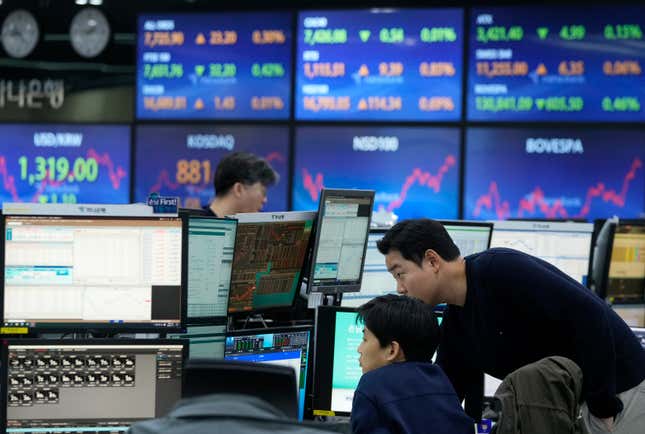
TOKYO (AP) — Asian shares advanced Thursday on the back of Wall Street’s climb to a near-record high, as Tokyo’s benchmark surged to its highest level since 1990.
The yen has weakened against the U.S. dollar, boosting export-related shares in a New Year rally that took the benchmark Nikkei 225 to 35,027.70, up 1.7% in morning trading.
Toyota Motor Corp. stock rose more than 4%, while Honda Motor Co. added 3% in morning trading. Sony Group Corp. rose 3.5%, and Hitachi gained 4%. Profit-taking was likely to keep the rises in check, analysts said.
Hong Kong’s Hang Seng added added 0.4% to 16,156.90, while the Shanghai Composite slipped 0.4% to 2,867.72.
Australia's S&P/ASX 200 gained 0.4% to 7,501.30. South Korea's Kospi rose 0.3% to 2,548.24.
The South Korean central bank kept its monetary policy unchanged at a policy meeting, as inflation remains above the 3% range.
“Growth conditions are holding up relatively well for now with the recent recovery in semiconductor exports,” Robert Carnell, regional head of research Asia-Pacific at ING, said in a report.
Shares rose Wednesday on Wall Street as traders locked in their final moves ahead of a report Thursday on inflation, which could show whether all the excitement that’s vaulted stocks toward records is warranted.
The S&P 500 rose 0.6% to 4,783.45, just 0.3% below its all-time high. The Dow Jones Industrial Average added 0.5% to 37,695.73, and the Nasdaq composite climbed 0.8% to 14,969.65.
Price increases have cooled since they peaked in the summer of 2022, raising hopes that the Federal Reserve may cut interest rates sharply this year.
Economists expect Thursday’s report to show prices paid by U.S. consumers were 3.2% higher in December than a year earlier, according to FactSet. That would be a slight acceleration from November’s 3.1% inflation rate. But after ignoring the effects of food and fuel prices, which can quickly shift from month to month, economists believe underlying inflation trends likely continued to cool.
The Fed has hinted at possibly cutting interest rates three times this year. Many traders are anticipating double that number of rate cuts, but critics say that’s overly optimistic.
The yield on the 10-year Treasury has already slumped well below its perch above 5% in October on strong hopes for rate cuts. It edged a bit higher Wednesday, up to 4.03% from 4.02% late Tuesday.
On Wall Street, Boeing's stock stabilized after slumping earlier in the week following the in-flight blowout of one of its planes flying for Alaska Airlines. It rose 0.9%.
The big companies in the S&P 500 are set to begin reporting their results for the last three months of 2023 on Friday. Delta Air Lines, JPMorgan Chase and UnitedHealth Group will be among that day’s headliners.
Analysts are forecasting a half dozen stocks will be responsible for most of the S&P 500's growth in the last quarter. But trends are improving a bit, according to strategists at Bank of America. They say 66% of companies are expected to report growth in profit, up from 64% in the third quarter.
“While risks remain, fundamentals are improving and analysts sound more optimistic than they did in” the summer, Ohsung Kwon and Savita Subramanian said in a BofA Global Research report.
Some of Wall Street's heavier losses Wednesday came from stocks of oil-and-gas companies. Exxon Mobil sank 1%, and Devon dropped 1.9%.
Benchmark U.S. crude added 23 cents to $71.60 a barrel early Thursday. It dropped 87 cents to $71.37 on Wednesday. Brent crude, the international standard, added 24 cents to $77.04 a barrel.
In cryptocurrencies, bitcoin was swinging around $46,000 shortly after the Securities and Exchange Commission said it would allow for the trading of exchange-traded funds that hold actual bitcoins, instead of just futures contracts related to them.
The SEC appeared deeply split over the decision. One commissioner called it an overdue move to give investors the ability to express their thoughts on bitcoin, while another described it as an unsound action that “put us on a wayward path that could further sacrifice investor protection.”
In other currency trading, the U.S. dollar slipped to 145.52 Japanese yen from 145.62 yen. The euro cost $1.0976, little changed from $1.0975.
____
AP Business Writer Stan Choe contributed.